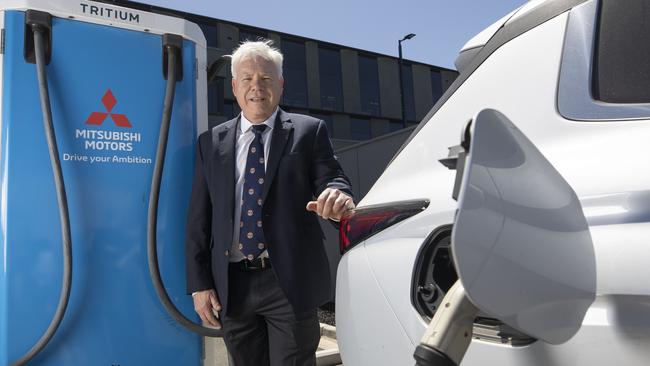Mitsubishi Motors Australia chief executive Shaun Westcott says EVs could help drive down power bills
South Australia has failed to capitalise on its rooftop solar wins, but there’s another opportunity in our driveway, an Australian automotive leader says.
SA News
Don't miss out on the headlines from SA News. Followed categories will be added to My News.
South Australia is saddled with some of the world’s highest electricity charges but failing to reap the benefits of its world-leading embrace of rooftop solar panels, says Mitsubishi Motors Australia chief executive Shaun Westcott.
In an interview with The Advertiser, Mr Westcott urged federal government changes to drive down household power bills during a cost-of-living crisis, by encouraging the use of plug-in hybrid and electric vehicles as high-capacity batteries for solar panels.
Mr Westcott also warned battery technology meant tradies’ utes and other commercial vehicles likely would not meet new federal emissions standards, or range, payload and towing capacity would be inadequate.

The Adelaide-based Mr Westcott said enabling cars to be used as batteries, and even export electricity to the grid, would reduce reliance on expensive gas-fired electricity peaking plants and costly interstate transmission lines.
Called bi-directional charging, this enables solar panels to fuel vehicle batteries and, in reverse, those batteries to be charged elsewhere and pump electricity back into the home.
“The biggest opportunity we have, is that South Australia, with 70 per cent-plus solar rooftop penetration, is leading the world in one aspect but, controversially, we also have one of the highest energy charges in the world,” Mr Westcott said.
“So we’re not seeing the benefits of that massive renewable energy investment being realised in the pockets of South Australians – and therein lies the gap.”
Mitsubishi and some other plug-in hybrid and electric car brands have bi-directional charging capability.
“There is an opportunity to use our cars as a sink or a sponge, where we soak up that solar energy during the day and then put it back onto the grid in the evening, when power prices are at the highest, or putting it into our homes,” Mr Westcott said.
“You can then reset the car to start charging at two or three in the morning, when energy costs are at their lowest – or even better during the day through solar, or at work, or wherever your car may be – to reduce your energy consumption and energy cost.”
Mitsubishi has worked with Adelaide-based V2Grid Australia on a bi-directional charger costing about $10,000 – less than many popular home batteries of which cars have almost double the capacity.
Mr Westcott urged expedited approval of federal regulations, already in place in SA, to enable a national rollout of the technology.
Ahead of a federal election expected within weeks, Mr Westcott also called for an extension of fringe benefit tax exemption for plug-in hybrid vehicles, which currently ends on April 1.
He said newly introduced vehicle emissions standards should be aligned with the pace of available technology.
“Current battery technology doesn’t give you the range, the payload or the towing capacity that the majority of small business needs in Australia to keep the wheels turning,” Mr Westcott said.
“But the standards and the penalties are high and there’s going to be a significant cost to the majority of manufacturers, in the form of penalties, for those high-emitting vehicles for which the right technology is still in its infancy.”
Westcott warns education profits cost Australia
Higher education has become commercialised and commodotised, says Mitsubishi Motors Australia chief Shaun Westcott, with too much focus on short-term revenue generated by foreign students.
In a bid to foster long-term economic growth and a dynamic, skilled workforce, Mr Westcott says Australia should move from an “educate and evacuate” model to one of “train and retrain”.
Mr Westcott said education’s main role should be to enable growth and success, by building a nation’s capacity, intellectual capital, innovation and competitive advantage.
“I am concerned that as a nation we may have lost sight of this fact and that our focus has become the commercialisation and commoditisation of higher education. That we measure the success of education as how many seats we have sold to foreign students and how much short-term revenue we have generated from education that takes flight and leaves the country after three or four years,” Mr Westcott said.
“That we are exporting our intellectual capital instead of making it ‘sticky’, and retaining it here in Australia as a treasure trove of talent, a resource pool for innovation, and competitive advantage, instead of exporting it to countries who will apply that intellectual capacity to develop products that they then sell back to us as goods and services at a premium price.
“Instead, we need to leverage education as a tool to facilitate economic activity, driving innovation in our economy and society.”
Mr Westcott argued almost 95 per cent of innovations adapted by Australian businesses were pre-existing technologies developed elsewhere, showing the nation was a technology taker, not a maker.
“For Australia to develop a competitive advantage on the global stage, we need to rethink the role of education to create a pool, or reservoir, of talent in future skills in such areas as software and services, cybersecurity, from robotics to biotechnology, space and defence, including the traditional industry skills we lack,” he said.
More Coverage
Originally published as Mitsubishi Motors Australia chief executive Shaun Westcott says EVs could help drive down power bills





